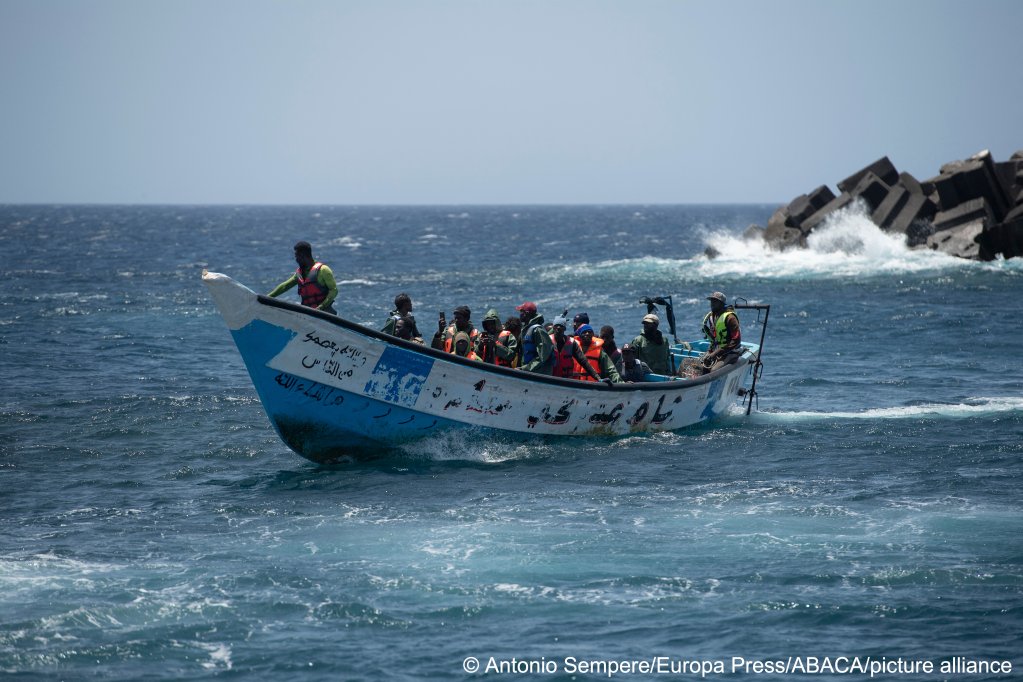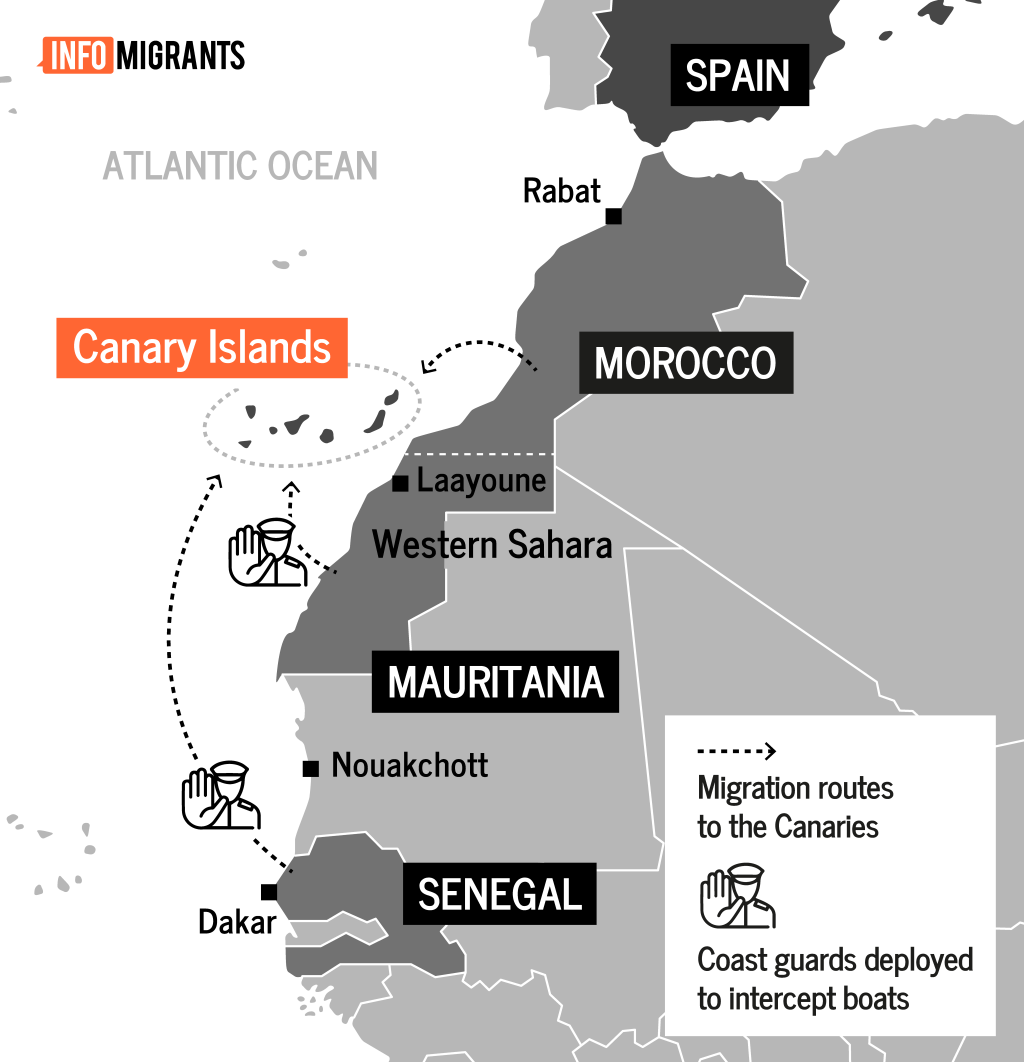Spain's Ministry of the Interior has declared that since the beginning of 2025, the number of arrivals in Canary Islands had almost halved — with under 11,600 people successfully making the dangerous sea journey to the archipelago from mainland Africa. But could this apparent decline in arrivals be misleading?
The main reason for the 46 percent decline in migrant arrivals in recent months was officially cited as Spain's close cooperation with Mauritanian officials in stopping migrant departures.
The West African nation has become the main departure point for people trying to reach the Canaries, which is why Spain and the European Union have signed multiple agreements to stem the flow of migrants and combat smuggling and trafficking organizations operating in Mauritania.
In return for its role in stopping migrants, Mauritania received a total in investments of roughly 500 million euros in 2024 alone.
Many human rights group, however, have accused the Mauritanian government of spending EU funds on using heavy-handed tactics to keep migrants out, including reports of pushbacks.
Migrants from neighboring Mali, in particular, have raised alarm over Mauritania's choice of means to keep people from migrating.
Spain has also signed deals in the past with other African partners such as Morocco; however, the current focus is on the partnership with Mauritania, as departures from the West African nation's coast have risen sharply in the past two years.
Read AlsoMali criticizes Mauritania for ill treatment of irregular migrants
Spain's African partners help to prevent departures
Spanish Prime Minister Pedro Sanchez has visited the Mauritanian capital Nouakchott three times in the past 18 months alone, most recently two weeks ago.
Sanchez says he also seeks to promote "orderly, safe and regular" immigration channels such as employment and training as an alternative to irregular journeys, while stressing that accepting migrants that do manage to reach Spain's shores is also a "humanitarian obligation."

In 2024, a record-breaking number of more than 46,000 migrants managed to reach the Canary Island by boat, which is about 7,000 more than in 2023.
According to the Spanish aid organization Caminando Fronteras, over 10,000 people are believed to have died while trying to reach the islands in 2024, making the Atlantic route possibly the deadliest migration pathway.
The UN Migration Agency IOM Missing Migrants' project has calculated a much lower number (1,215) of deaths during 2024, but they caveat their data by saying the actual numbers may be much higher, and they only count deaths and missing they can ascertain precisely. Many migrants set off without telling anyone what they are doing, and so can disappear without a trace in the vast Atlantic Ocean.
Read AlsoSpain: Migrants taking riskier 2,000-kilometer sea journeys to reach Canaries
Current trend not sustainable in expert view
These new numbers might offer momentary relief in Madrid but are not likely to be a reflection of any long-term solutions truly taking root.
Gonzalo Marrero, the head of the Christian NGO Caritas in the Canary Islands, told the KNA news agency that the situation of those who already are on the Canaries remains precarious, highlighting that he felt particularly concerned about the 6,000 unaccompanied minors who are currently in state reception centers there.
Marrero also stressed that migration patterns don't change in the long run just because of policy changes:
"If you look at the migration history of the Canary Islands, since the arrival of the first refugee boat 30 years ago, there has been a constant but cyclical influx of migrants, sometimes stronger, sometimes weaker, depending on international agreements and border closures," Marrero explained.

Jose Antonio Rodriguez Verona, who works for the Red Cross in the Canary Islands, believes that the current trend will soon witness a reversal: He explained that in view of the upcoming stormy season as of October, he expects another peak in arrivals from Africa in coming weeks and months.
Lidia Hernandez, the coordinator of the Spanish Commission for Refugee Aid (CEAR), meanwhile believes that people will just "look for alternative routes when a path is blocked."
Read Also Canary Islands: Deaths, arrivals and the ongoing debates over redistributing young migrants
More migrants turning to Balearic Islands
The trend of arrival numbers reducing towards the Canaries stands in contrast to growing migrant arrivals in the Balearic Islands, where Algeria has emerged as the main point of departure.
According to the latest data from the UN Refugee Agency UNHCR, nearly 3,500 (3,431) migrants made their way to the island group in the Mediterranean on 182 boats from Algeria, landing mainly on the Balearic islands of Ibiza and Mallorca, since the beginning of the year. The data was last updated on July 27.
UNHCR said that this marks an increase of 124 percent compared to 2024.
The rise in arrivals on this route could potentially be attributed to the increase in controls on the Atlantic route to the Canaries from Mauritania.

Read AlsoMauritania is main country of departure for migrants to Spain
Dozens rescued, one dead amid lull in arrivals
Still, the Canary Islands remain the main focus of Spain's migration policy: On Tuesday, the Spanish coastguard rescued another 176 people from a sinking boat off the island of Gran Canaria.
The previous night, over 100 people were saved at sea while one person died following a shipwreck located about 300 kilometers away from the Spanish archipelago.
That crossing attempt appears to have originated from Morocco, raising questions over whether more migrants will again try to attempt to reach the Canaries from Moroccan soil rather than Mauritania, as sea patrols and EU-funded other checks there are successfully limiting the number of those who do make it across.
with KNA
